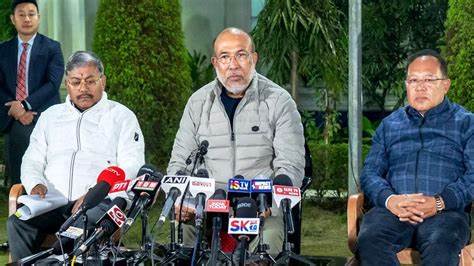In a bid to enforce discipline and accountability among government employees, the Manipur government has taken a decisive step by introducing the ‘no work, no pay’ rule. This policy, aimed at ensuring efficiency and productivity in the public sector, signifies a paradigm shift in the state’s approach towards governance and employee conduct. The move comes as part of the government’s broader efforts to streamline administrative processes, enhance service delivery, and promote a culture of responsibility among its workforce.
Under the ‘no work, no pay’ rule, government employees in Manipur are required to fulfill their duties and responsibilities diligently and efficiently. Failure to do so will result in the deduction of their salaries for the period during which they are absent from work without valid reasons. This policy serves as a deterrent against absenteeism, tardiness, and dereliction of duty, thereby fostering a culture of punctuality, discipline, and accountability in the workplace.
The introduction of the ‘no work, no pay’ rule reflects the government’s commitment to promoting good governance and transparency in its operations. By holding employees accountable for their performance and ensuring that taxpayer funds are utilized effectively, the policy aims to enhance public trust and confidence in the integrity of the government machinery. It sends a clear message that the Manipur government is serious about upholding the highest standards of professionalism and ethics in its conduct.
Moreover, the implementation of the ‘no work, no pay’ rule is expected to have a positive impact on the overall efficiency and productivity of government departments and agencies in Manipur. By incentivizing employees to fulfill their duties diligently and conscientiously, the policy is likely to result in improved service delivery, faster decision-making, and greater responsiveness to the needs of citizens. This, in turn, will contribute to the state’s development agenda and enhance the quality of life for its residents.
The introduction of the ‘no work, no pay’ rule also underscores the government’s commitment to fiscal discipline and prudent financial management. By reducing wastage and inefficiency in the public sector, the policy aims to optimize resource allocation and maximize the impact of government spending on priority areas such as healthcare, education, infrastructure, and social welfare. This will help to ensure that taxpayer funds are utilized judiciously and in accordance with the public interest.
Furthermore, the implementation of the ‘no work, no pay’ rule is a reflection of the government’s proactive approach to addressing systemic challenges and improving governance practices in Manipur. By tackling issues such as absenteeism and low productivity head-on, the policy lays the foundation for a more accountable, responsive, and performance-driven public sector. It also sets a precedent for other states to emulate, demonstrating the importance of strong leadership and decisive action in driving meaningful change.
However, while the ‘no work, no pay’ rule is intended to promote accountability and efficiency, its implementation must be carried out with sensitivity and fairness. It is essential for the government to provide clear guidelines and mechanisms for employees to report genuine reasons for their absence from work, such as illness or family emergencies. Additionally, efforts should be made to address underlying issues that may contribute to low productivity, such as inadequate infrastructure, training, or job satisfaction.
Moreover, the success of the ‘no work, no pay’ rule ultimately depends on its effective enforcement and monitoring mechanisms. The government must establish robust systems for tracking employee attendance, performance, and compliance with the policy. This may involve the use of technology, such as biometric attendance systems or digital monitoring tools, to ensure transparency and accountability in the workplace.
In addition, the introduction of the ‘no work, no pay’ rule by the Manipur government represents a significant step towards promoting accountability, discipline, and efficiency in the public sector. By incentivizing employees to fulfill their duties responsibly and ensuring that taxpayer funds are utilized effectively, the policy aims to enhance the quality of governance and service delivery in the state. While its implementation may pose challenges, the potential benefits of the policy far outweigh the costs, making it a valuable tool for driving meaningful change and progress in Manipur.




